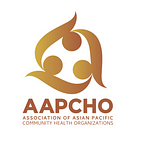#COVID19CHC: Providing Telehealth Services for COVID-19 and Beyond
By Kristine Cecile Alarcon, MPH
Community health centers (CHCs) provide care to over 29 million people in the United States including over 1.2 million Asian Americans (AAs), Native Hawaiians and Pacific Islanders (NHPIs). AAPCHO member health centers and other CHCs across the country provide care to the most vulnerable in our communities, serving primarily low-income and uninsured patients who would otherwise not get the care that they need. CHCs play a critical role and are at the frontlines of responding to the coronavirus disease 2019 (COVID-19) pandemic — yet do not have the same access to medical supplies and other much-needed resources as large hospitals or other medical providers.
AAPCHO’s #COVID19CHC Stories series aims to shed a light on the critical role of CHCs, and why we need to ensure clinics have the resources and support they need to provide care for the most vulnerable in our communities when they need it most.
COVID-19 has accelerated the implementation of telehealth, with CHCs leading the charge in finding innovative ways to ensure patients continue to receive the care that they need despite the pandemic. In this episode, Dr. Andrea Caracostis, chief executive officer of HOPE Clinic in Houston, shares insights on how the CHC implemented telehealth services amid COVID-19.
When the COVID-19 pandemic hit, HOPE Clinic in Houston was in the early stages of implementing telehealth services. Telehealth was used for delivering behavioral health services and to communicate internally among other health center staff. As COVID-19 affected the Houston community, staff had an idea of how to use telehealth to deliver care to patients.
Dr. Caracostis recalls how telehealth was implemented at HOPE Clinic, “The first thing we did was train our providers. We did one-on-one training. We rolled out a web-televised and recorded training module for providers on how to conduct a televisit. It includes the understanding of how to code, where to record, how to communicate with the patient, how to address IT issues with your visit, and how to keep the visit within time limit.”
Dr. Caracostis was also mindful of the patient experience in these telehealth visits.
“We’ve been helping our patients [use] our call center [to help them identify the] technology they need for the visit: they need the app, the account number, and the login. And, at the end of the visit, the patient will have a summary of their visit, learn how to access their own apps, and ask any question to the physician,” Dr. Caracostis shared.
HOPE Clinic also saw that access to technology and telehealth visits are not equal for all patients. Dr. Caracostis raised the need to advocate for patients to tackle this added barrier.
“The internet connection, the bandwidth is not large enough to conduct a longer face to face medical visit. There needs to be strong advocacy from our part to figure out how we are we going to make sure that patients have access to really good wifi and internet to conduct this visit.”
Providing accessible care for the most vulnerable in our communities is a high priority for HOPE Clinic like all AAPCHO members and other CHCs across the country. As the environment continues to change, CHCs are making adjustments and implementing innovative solutions that will have lasting impacts beyond the COVID-19 pandemic.
“[Telehealth] is here to stay. This is how doctors and patients are going to prefer to have a visit long term. The sooner we get the community trained on this methodology, then the more patients will be served for the future.”
To support health centers like HOPE Clinic, contact your Members of Congress and ask them to support increasing resources for CHCs to address the COVID-19 pandemic and long-term funding. Take action now! You can also support HOPE Clinic and other AAPCHO members by donating much-needed PPE or other medical supplies through AAPCHO’s CHC PPE Hub.
If you have any questions related to COVID-19, email us at preparedness@aapcho.org and visit our website for in-language and culturally competent resources. For telehealth-specific resources visit our website.
Special Thanks: Beverly Quintana, Andrea Caracostis, MD, MPH, and Asian American Health Coalition dba HOPE Clinic
